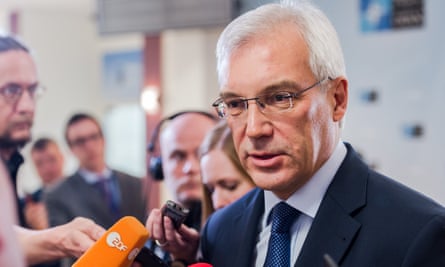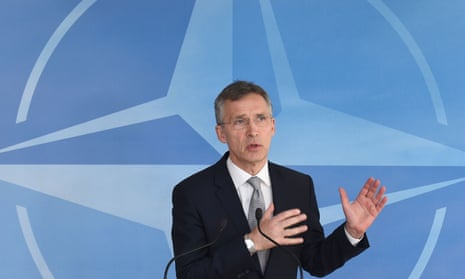Nato and Russian officials held the first meeting for nearly two years of a joint council on Wednesday but failed to make any apparent progress in resolving increasingly dangerous military tensions.
The meeting of the Nato-Russia Council (NRC) overran by more than an hour but ended without any agreement on the most urgent issue: reducing the risk of close military encounters between the two sides.
“Nato and Russia have profound and persistent disagreements. Today’s meeting did not change that,” the Nato secretary general, Jens Stoltenberg, said after the Brussels meeting.
“Nato allies confirmed that there can be no return to practical cooperation until Russia returns to respect of international law. But we will keep channels of communication open.”
US and Russian diplomats set up Wednesday’s meeting after military tensions reached dangerous new levels last week, when a Russian fighter jet flew within 10 metres of a US destroyer on the Baltic Sea, the latest in a series of close military encounters.
The NRC was set up in 2002 to improve cooperation and communication but has not met since June 2014, when Nato suspended all practical and technical military cooperation in protest at the annexation of Crimea and Moscow’s covert intervention in eastern Ukraine.
The council was not formally suspended, leaving the door open to political discussions between ambassadors, but in fact diplomats had not met, nor even agreed an agenda for meeting, since 2014.
Stoltenberg said a follow-up meeting had not been agreed, but added that he expected a meeting would take place “since we never suspended the council”.

Speaking after Stoltenberg in the corridors of Nato’s political headquarters in Brussels, the Russian ambassador, Alexander Grushko, said: “We have to assess the results of these discussions and then decide if necessary whether to meet again.”
Asked whether there had been agreement on anything at Wednesday’s meeting, Grushko said there had been common ground in voicing concern on the security situation in Afghanistan.
Since the Ukraine crisis erupted, Nato and Russia have staged ever more ambitious and elaborate military exercises near their borders, while Moscow’s intervention in Syria brought the Russian military in tense proximity to Turkey.
In November, a Turkish jet shot down a Russian Su-24 bomber that Ankara said had flown over its airspace. It was the first such incident, involving a Nato member downing a Russian plane, since the Korean war. It emphasised the lack of a permanent open channel of communication between Nato and Russian armed forces.
The Wall Street Journal on Wednesday quoted US officials as saying Russia had moved artillery into northern Syria, in possible support of an imminent regime offensive which would end a shaky two-month ceasefire.
“We have a responsibility to ensure predictability, confidence and stability across our region,” Stoltenberg said. “The armed forces of every nation and every military alliance have the right to exercise but in recent years allies have seen a decrease in transparency in military activity, combined with an increase in military activity, and forces and strong rhetoric. This is a dangerous combination.”
He said work was continuing to modernise the Vienna document of the Organisation for Cooperation and Security in Europe (OSCE), which is supposed to govern rules on transparency over military exercises and conflict prevention.
A western diplomat at Nato said the Russian side “didn’t evince particular interest in talking about greater transparency or working on the Vienna document” and had blamed the recent close military encounters on Nato encroachment on Russia’s border areas.
On the situation in Ukraine, Stoltenberg said the recent increase in violations of the ceasefire agreed in Minsk in 2015 was “deeply disturbing” and pointed to incidents in which OSCE monitors had been targeted, adding that Russia had a particular responsibility in ensuring the Minsk agreement was adhered to.
Grushko blamed the Ukrainian government in Kiev for breaking the accord by not implementing agreed political measures.
